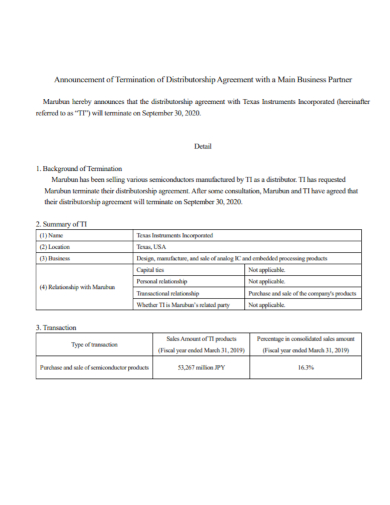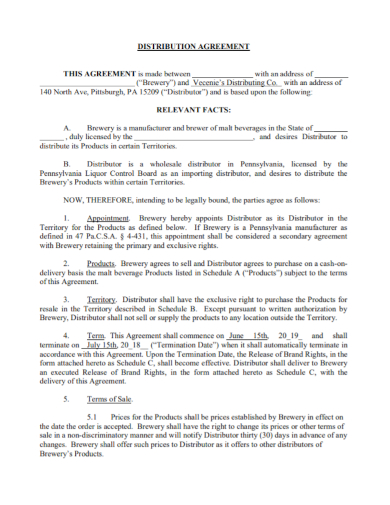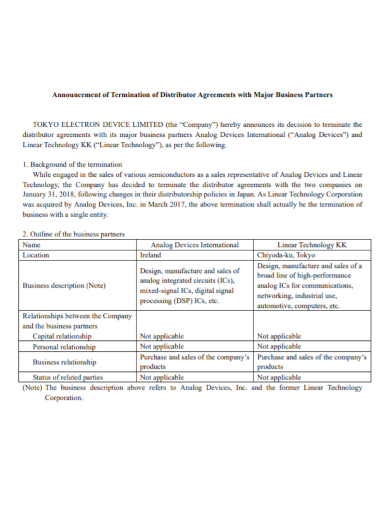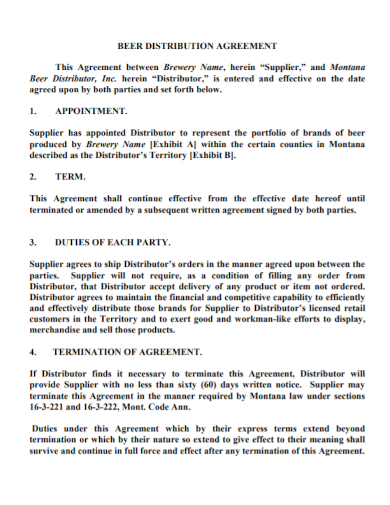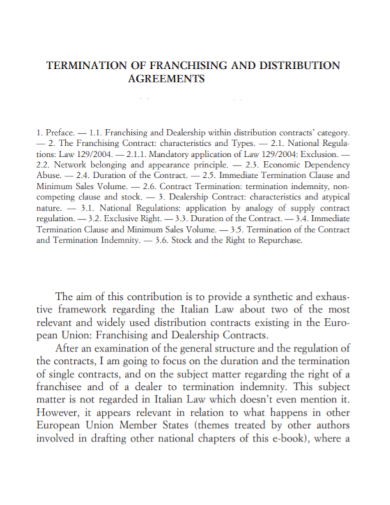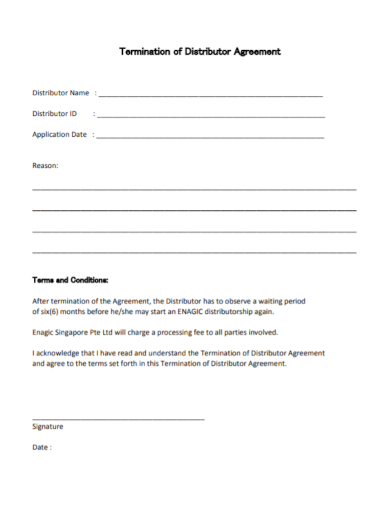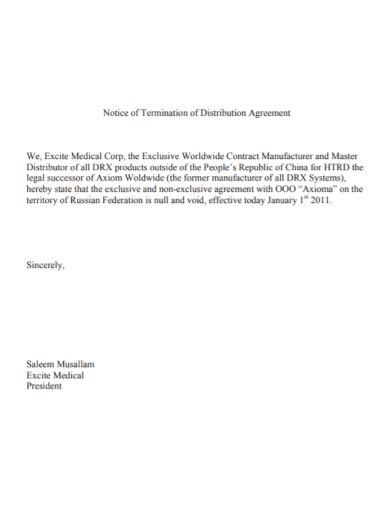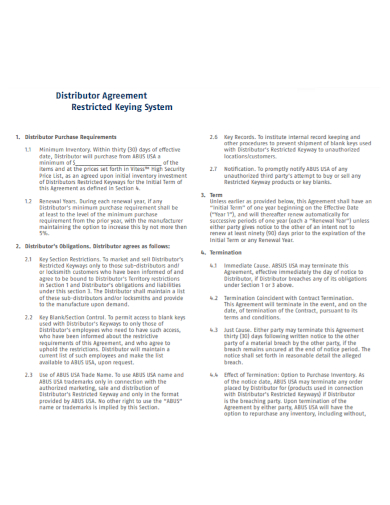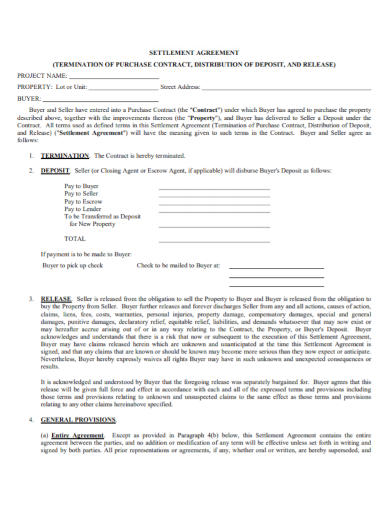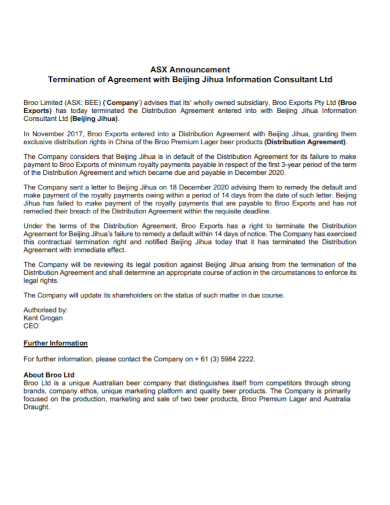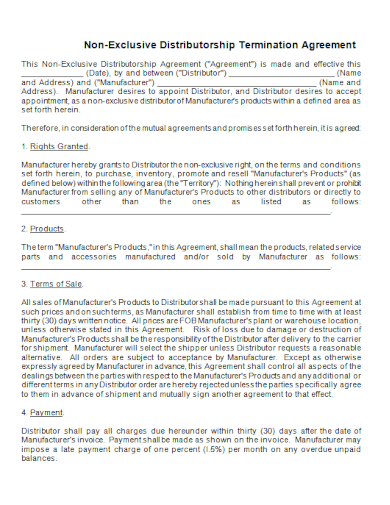Terminating a distribution connection, especially one that has been long-standing and profitable, is never an easy decision. When terminating a distributorship agreement, a manufacturer/supplier must be careful to follow the provisions of the agreement, as well as any applicable statutes or common law that may apply to the arrangement. A supplier must consider more practical difficulties, such as supplying customers in the terminated territory, notifying other distributors in the network, and external contacts, both with the terminated distributor and customers, in addition to contractual and legal ramifications.
10+ Terminating Distributorship Agreement Samples
A distributor is hired by a company to deliver a product to its clients. The distributor relies on the manufacturer’s revenue to stay in business. Both sides must agree on how the distributor will deliver the products and how much the producer will pay for it. When these arrangements become unmanageable, the parties might opt to dissolve the distribution agreement, negotiate a new one, or end the relationship. A distributor can transport or resell products purchased from a manufacturer under the terms of a distribution agreement. The products are supplied by the producer, and the distributor, either as a wholesaler or a store, acts as the vendor.
1. Termination of Distributorship Agreement
2. Terminating Distribution Agreement
3. Termination of Distributor Partner Agreement
4. Beer Distribution Termination Agreement
5. Termination of Franchising Distribution Agreement
6. Termination of Distributor Agreement
7. Notice of Termination Distribution Agreement
8. Distributor System Termination Agreement
9. Distribution Termination Settlement Agreement
10. Company Distribution Termination Agreement
11. Non-Exclusive Distributorship Termination Agreement
Termination Clause
Many distribution agreements have a clause that permits one or both parties to terminate the agreement without having to go through the legal process. The grounds for termination, the amount of prior notice required, and any monetary compensation that one party may be required to pay are all commonly included in a termination clause. Any termination dates must be included, as well as if the agreement will automatically terminate if any of the contract’s conditions are breached.
Negotiation and Revision
The manufacturer and distributor can discuss a change to the current agreement if the distribution agreement does not include a termination clause. Renegotiation illustrates that the parties can continue work together even though their circumstances have changed since they signed the initial agreement if both parties still consider the relationship as profitable and worthwhile. These efforts also demonstrate that even if the parties are unable to achieve a new agreement, they can cooperate to avoid a costly lawsuit.
Termination Notice and Compensation
The party attempting to terminate the agreement must provide the other party as much notice as feasible. This forewarning gives the opposing party enough time to make alternative plans. Some states need up to 90 days’ notice to terminate a distribution agreement if the agreement’s termination clause does not specify a time range. The agreement could also stipulate that one party reimburse the other for revenue lost as a result of the termination.
First and foremost, the distributorship agreement should be checked to ensure that the reasons for termination are clearly stated in the written agreement. Does the agreement, for example, state that sales targets must be met, or that a distributor must meet specific reporting or payment terms? The greater the ability of a supplier to pinpoint the particular provisions of the agreement that have not been met by the distributor, the less likely it is that the supplier’s decision to terminate would be disputed, or, conversely, the stronger the supply’s defenses will be if questioned.
FAQs
Is there an applicable statute requiring “good cause” as a basis for termination?
State statutes frequently provide additional protection to dealership and distributorship relationships. When a “community of interests” exists, specific dealership statutes covering farm implements, motor vehicles, or intoxicating liquors often exist, providing additional legal protections for distributors/dealers doing business in those states, requiring “good cause” before an agreement can be terminated with a required notice period and an opportunity to cure. A bankruptcy action brought by the distributor, or moral turpitude or other unethical actions by the distributor, are frequently used as examples of good cause. Under some statutes, simply failure to comply with the terms of the agreement might also be considered good reason.
Is the basis of the decision to terminate supported by objective and quantifiable data?
If a supplier’s decision to terminate is based on a written provision in the agreement and/or “good cause” as defined by law, objective criteria and quantifiable facts are required to back up the decision. For example, if a distributor fails to meet objective sales targets or fails to pay invoices within agreed-upon time frames, documentation should be provided to back up these claims. If the supplier is terminated due to poor performance, such as customer complaints, the supplier should maintain documented proof of the complaints and any reprimands made to the distributor. If such paperwork exists, make sure it is accurate, authentic, and well-preserved.
If you want to see more samples and formats, check out some terminating distributorship agreement samples and templates provided in the article for your reference.
Related Posts
FREE 10+ Mentoring Agreement Samples In MS Word | Apple Pages | PDF
FREE 10+ Partner Agreement Samples In MS Word | Google Docs | Apple Pages | PDF
FREE 10+ Individual Agreement Samples In MS Word | Google Docs | Apple Pages | PDF
FREE 10+ Strategic Agreement Samples In MS Word | Google Docs | Apple Pages | PDF
FREE 10+ Equity Agreement Samples In MS Word | Google Docs | Apple Pages | PDF
FREE 10+ Producer Agreement Samples in MS Word | Apple Pages | PDF
FREE 10+ Grant Agreement Samples In MS Word | Apple Pages | PDF
FREE 8+ Meeting Agreement Samples in MS Word | Google Docs | Apple Pages | PDF
FREE 10+ Community Agreement Samples In MS Word | Google Docs | PDF
FREE 8+ Real Estate Option Agreement Samples in MS Word | PDF
FREE 10+ Call Option Agreement Samples In MS Word | PDF
FREE 10+ Advertising Agreement Samples In MS Word | Google Docs | Apple Pages | PDF
FREE 10+ Car Agreement Samples In MS Word | Google Docs | Apple Pages | PDF
FREE 10+ Horse Agreement Samples In MS Word | Apple Pages | PDF
FREE 10+ Option Agreement Samples In MS Word | Google Docs | Apple Pages | PDF

